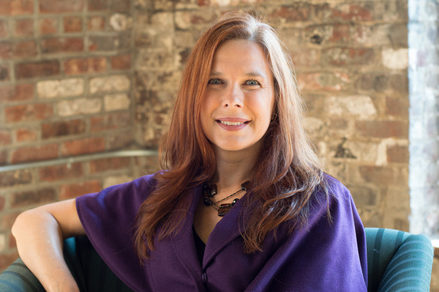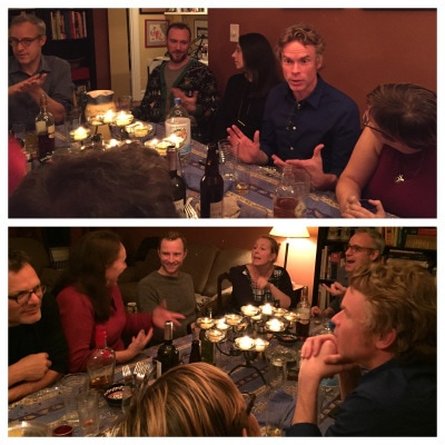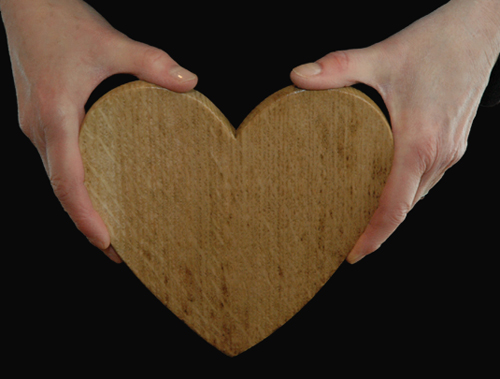|
So here we are, one month into 2017. Remember those intentions you started the year with? Those goals you were going to pursue and ideals you were going to embody? How's that working out? For all the resolve we start the year with, it's easy to get sidetracked. That's why I try to reboot my resolutions (or intentions, if you prefer that concept, as I do) from time to time.  Colleen Newvine Tebeau Colleen Newvine Tebeau If one of your intentions is to build connections with other people, my friend and former coworker Colleen Newvine Tebeau has some great suggestions for enjoyable ways to make that happen. Colleen is a journalist turned MBA whose marketing consulting firm helps small and mid-sized businesses with practical strategy and tactics. She's also one of the most joyfully social people I know. So when I read a recent post in her blog, Newvine Growing, about cultivating friendships, I knew I had to share it with you. Colleen lives in Brooklyn, New York, but her suggestions work just as well if you live in a small town. Maybe you don't have a neighborhood cocktail bar to frequent, but you're probably not far from a coffee shop or café. But before I give away any more of her tips, I'll turn you over to Colleen. Here's her post on building social connections. Make this the year you value your relationships by Colleen Newvine If you're making resolutions, I’d like to recommend you aim for a different ambition than the typical "lose 10 pounds" or "quit smoking." Focus, for a change, on increasing and improving your connections to other people. Why? A New York Times article headlined, “How Social Isolation Is Killing Us,” said in part: Social isolation is a growing epidemic—one that’s increasingly recognized as having dire physical, mental and emotional consequences. Since the 1980s, the percentage of American adults who say they’re lonely has doubled from 20 percent to 40 percent. About one-third of Americans older than 65 now live alone, and half of those over 85 do. People in poorer health—especially those with mood disorders like anxiety and depression—are more likely to feel lonely. Those without a college education are the least likely to have someone they can talk to about important personal matters. A wave of new research suggests social separation is bad for us. Individuals with less social connection have disrupted sleep patterns, altered immune systems, more inflammation and higher levels of stress hormones. One recent study found that isolation increases the risk of heart disease by 29 percent and stroke by 32 percent. Another analysis that pooled data from 70 studies and 3.4 million people found that socially isolated individuals had a 30 percent higher risk of dying in the next seven years, and that this effect was largest in middle age. Loneliness can accelerate cognitive decline in older adults, and isolated individuals are twice as likely to die prematurely as those with more robust social interactions. These effects start early: Socially isolated children have significantly poorer health 20 years later, even after controlling for other factors. All told, loneliness is as important a risk factor for early death as obesity and smoking. If you need more convincing, I suggest you read the full article by Dhruv Khullar, a resident physician at Massachusetts General Hospital and Harvard Medical School. How to get started? Consider throwing a party  We host weeknight spaghetti dinners about once a month. It's a simple equation: spaghetti + wine + friends = one of my favorite rituals. We host weeknight spaghetti dinners about once a month. It's a simple equation: spaghetti + wine + friends = one of my favorite rituals. I love hosting parties, from intimate dinner parties to jam-packed cocktail parties. When people come to our parties, they sometimes say wistfully, "You’re so good at this. I wish I knew how to throw a party like this." Here's the truth: I began throwing parties in part because I was lonely. When my ex-fiance and I broke up, I realized I didn’t have close girlfriends to commiserate with, and I made a conscious decision to cultivate friendships. It felt less threatening to invite women I didn’t know well for a group gathering than to ask one out for a girl date over coffee or drinks. I began hosting clothing swaps because inviting people to join me for an activity felt like a more attractive offer; they didn’t have to want to hang out with me, they just had to want some free gently used clothes. I wasn’t experienced at hosting but I learned as I did it more. Slowly some of those women became friends, and I still host clothing exchanges two decades later. If you feel shy about asking someone for one-on-one plans, consider hosting a small group at your place. If you don't click with anyone who comes, you can casually drift to another conversation or excuse yourself to tend to some unspecified task in the kitchen. Hosting doesn’t have to mean a lot of work. When the economy tanked in 2008, we hosted happy hours at home to give our friends a less expensive way to socialize. We'd tell people to bring whatever they wanted to drink and eventually we’d order pizza and ask people to kick in. That’s really it. All we offered was the venue. You could invite a couple of people to watch movies and get food delivered or throw a frozen pizza in the oven. Host a potluck dinner. Set up an activity you’d like to do anyway—make beer or jewelry, do scrapbooking, get out your musical instrument—and ask acquaintances you’d like to know better or friends you don’t see often enough to join you. If you’d like to try hosting, here are a few posts I’ve written with suggestions: Become a regular at a bar or coffee shop near you Socializing at home isn’t the only option, of course. You can enjoy a bar, cafe, coffee shop or other gathering place near you.  John and I treat our local cocktail bar, the Long Island, as an extension of our living room. We stopped there for a drink to start New Year’s Eve, then boomeranged back at the end of the night. John and I treat our local cocktail bar, the Long Island, as an extension of our living room. We stopped there for a drink to start New Year’s Eve, then boomeranged back at the end of the night. Ray Oldenburg wrote a book called The Great Good Place in 1989 that spoke of the "third place"—someplace that's not home and not work, but another spot where you connect with your community. Going to your third place isn't just about scheduling a date to meet people you already know but about chatting with whoever’s there. That means putting down your phone, making eye contact and opening yourself up to strangers. The development of the individual depends on meeting people from different walks of life, and getting to know them. That's good for the individual, and it's good for the community. Coffee shops are great, and bars are great—they offer an edge because of what you consume, and you can relax and warm up to other people. In a recent interview in Imbibe magazine, Oldenburg said: The development of the individual depends on meeting people from different walks of life, and getting to know them. That’s good for the individual, and it’s good for the community. Coffee shops are great, and bars are great — they offer an edge because of what you consume, and you can relax and warm up to other people. We feel fortunate to have fallen deeply in love with a cocktail bar a block from our apartment. It's a place where we go to celebrate as well as to sulk or mourn, and where we feel welcomed and cared for, more like family than customers. It's the first time in our lives we truly feel like regulars someplace. It took trial and error to find the right place and to connect beyond a simple business transaction. Here's some of what worked for us in finding our local hangout:
My husband, John Tebeau, is writing a book about 50 great New York bars, not places with the very best cocktails or the hippest places, but bars that are beloved gathering places. Visiting dozens of bars to scout them for his book has given us copious practice engaging with barkeeps and regulars, and as someone who used to find sitting at the bar intimidating, I can tell you that the more you do it, the easier it gets. I’ve learned to read the body language of patrons open to chatting and to gauge when a bartender has time to socialize versus needing to focus on the task at hand. Like hosting parties, it gets easier the more you do it. Bring a social element to something you'd do anyway Ari Weinzweig, co-founder of Ann Arbor institution Zingerman's, taught a webinar on time management last year that was beautifully philosophical—it wasn't about shoehorning more productivity into each day but about living well by prioritizing how we spend our time. One of the practical pointers Ari gave was to combine priorities so he can accomplish more things he values simultaneously. For example, if you want to exercise and you want to socialize, work out with a friend. My husband, John, had a standing racquetball date with a co-worker twice a week when we lived in Ann Arbor. That's part of why we're still friends with his racquetball partner, Bob, two decades later. I once read about two moms who swapped helping each other clean. They'd both spend an hour cleaning one family's house, talking as they did it, then they'd switch to the other house. It turned a grudge task into bonding time. What do you do—or what would you like to do—that could work as a social activity? Make it a priority to show people you love them  I understand the demands of time. These are all watches I personally own, and that ain’t even all of them. I understand the demands of time. These are all watches I personally own, and that ain’t even all of them. I hear a lot of people, especially in go-go-go New York City, saying they just don’t have time to socialize. They work long hours, wrapped in a long commute on each side, then maybe they have the demands of parenting waiting at home. I get that you might already feel you don’t have enough hours in the day, and squeezing in a brunch date sounds more stressful than relaxing. But if you value your relationships, can you prioritize maintaining those connections enough to make time? Is there something you’re doing that you could ditch to make room for friendships, or could you make better use of downtime? Can you combine socializing with another activity, like Ari suggests? I have one friend with a high powered job who leaves substantive voicemails, so I feel connected even if we didn’t get to chat. Another friend who travels a lot sends thoughtful texts about something happening on the trip or something that reminded him of me. A successful business owner friend routinely leaves cheerful comments on my Facebook posts. They’ve found ways to fit connection into their busy lives. John and I spend a few hours every couple of weekends calling and writing people we love. We send postcards and texts as we drink our coffee. We value this enough that we schedule it in our shared Google calendar. Excellent ideas, Colleen! And I know many HeartWood readers have come up with great ideas for connecting with others, too—from the women's hiking club to dominoes games and craft nights. Share them here, and build more connections in the process!
6 Comments
Laura Bailey
2/1/2017 12:01:08 pm
I love this post! Incidentally, I've been to those clothing exchanges, and I loved them. Still miss them. I don't fit enough time into my life for socializing - I spend half my week working from home, writing, and it's very isolating. I have friends who send me texts throughout the day and this is so heartening. I am going to make time to do this for them, too. I really never thought of this as socializing, but nowadays, it definitely is. Thank you Colleen, for the great post!
Reply
Nan
2/4/2017 07:51:28 am
I know what you mean. I wish I'd had these recommendations when I was freelancing full-time. As you say, it can be very isolating.
Reply
2/10/2017 12:46:25 pm
So happy to be of help, Bailey!
Reply
Katherine Myers
2/1/2017 01:12:55 pm
At the last seminar my doctor gave, socializing was one of the topics emphasized if you wanted to stay healthy and happy, especially as you age. I realize that while I have excellent friends, none are close enough to see regularly if we don't schedule parties. Since our home is central to these scattered friends, I'm usually hostess and I love it. Feb. 12 is our next dinner party, celebrating Feb. birthdays! I'm also reading The Year of Living Danishly, a book whose author is trying to pin down why Danes are some of the happiest people in the world. Social connection is also stressed in this book--I'm only to April in her year, and I can't wait to find out more Danish secrets!
Reply
Nan
2/4/2017 07:52:57 am
Enjoy the dinner party! And I'll be interested to hear what you learn about living Danishly.
Reply
2/10/2017 12:49:02 pm
We're hosting two couples we love for a dinner party this weekend, too -- they're parents and we aren't so we're giving them the gift of a quiet dinner where they don't have to take care of anyone but themselves. We like celebrating Valentine's Day soaking up the love of good friends.
Reply
Leave a Reply. |
Written from the heart,
from the heart of the woods Read the introduction to HeartWood here.
Available now!Author
Nan Sanders Pokerwinski, a former journalist, writes memoir and personal essays, makes collages and likes to play outside. She lives in West Michigan with her husband, Ray. Archives
April 2022
Categories
All
|


 RSS Feed
RSS Feed